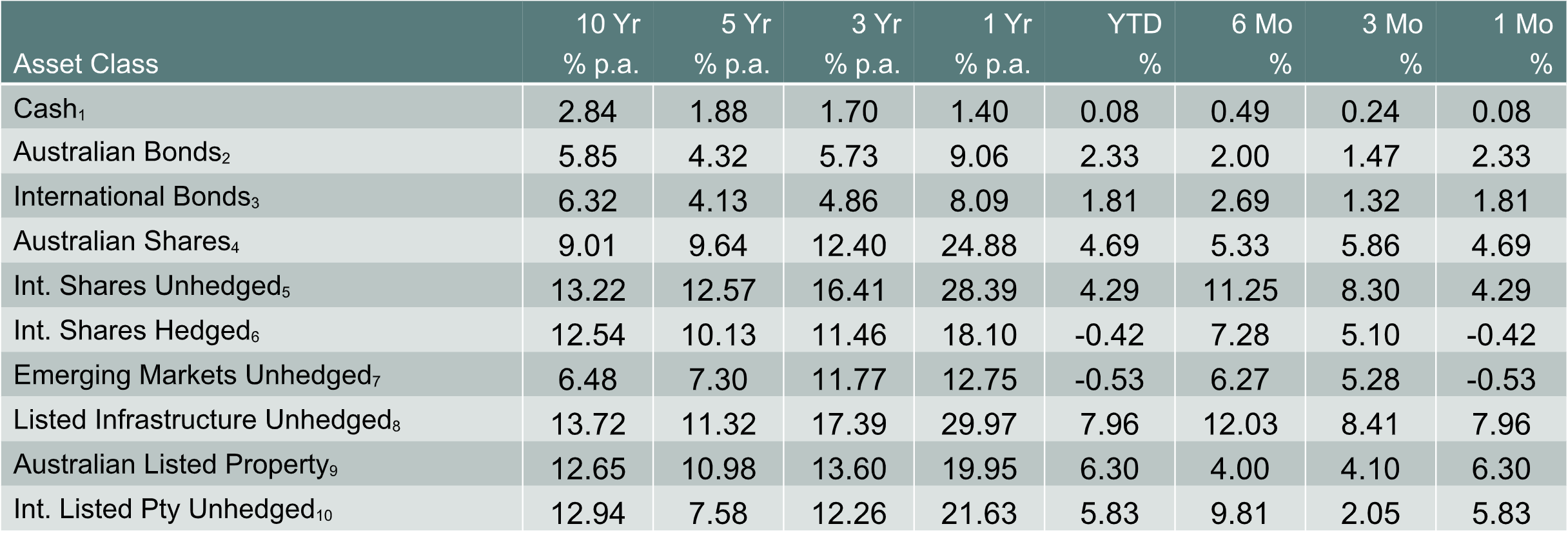
Monthly Market Review – January 2020
VIEW PDFRecent Market Update Key Points
While the last three days has seen equity markets around the world retreat from their previous highs, the returns for anyone who has been exposed to these markets over the last 12 months is still overwhelmingly positive.
The best defense for this kind of market volatility is to maintain a long term view and a well-
diversified portfolio that holds a range of investments including:
- Currency unhedged international equity portfolios which benefit from weakness in the Australian dollar
- Funds with an ability to short sell equities and hence benefit from falling share prices
- Exposures to commodities such as gold
- Defensive allocations to cash and fixed income
The graphs below highlight the five-year returns for the S&P 500 index in the United States and the S&P 200 index of Australian equities as well as regional returns over the last 12 months.



How the different asset classes have fared:
(As at 31 January 2020)

1 Bloomberg AusBond Bank 0+Y TR AUD, 2 Bloomberg AusBond Composite 0+Y TR AUD, 3 Bloomberg Barclays Global Aggregate TR Hdg AUD, 4 S&P/ASX All Ordinaries TR, 5 Vanguard International Shares Index, 6 Vanguard Intl Shares Index Hdg AUD TR, 7 Vanguard Emerging Markets Shares Index, 8 FTSE Developed Core Infrastructure 50/50 NR AUD, 9 S&P/ASX 300 AREIT TR, 10 FTSE EPRA/NAREIT Global REITs NR AUD
Australian shares rallied sharply in January, while international share markets (hedged) were broadly unchanged. Australian and international bond yields fell, and the Australian dollar depreciated against the US dollar.
Cash and Fixed Income
Australian and international bond yields steadily fell in January (bond prices rose). Bonds yields initially fell modestly following an escalation in tensions between the US and Iran early in the month, before extending lower after the outbreak of the coronavirus as investors flocked to safe-haven assets (pushing bond prices up and bond yields down).
The release of generally stronger-than-expected Australian economic data appeared to have little impact on bond yields over the month. Retail sales rebounded in November (boosted by Black Friday sales which likely pulled sales forward from December) and employment data was stronger-than-expected (driven by part-time jobs) which resulted in a slight fall in the unemployment rate. Inflation was also a touch higher than expectations but still well below the RBA’s 2-3% target. With economic data generally better than expected, the market pared back expectations of a rate cut by the RBA at its February meeting to only a 10-20% chance. House prices strengthened further in December, led by strong gains in Sydney and Melbourne. Housing loan approvals also continued to increase, while housing credit growth remained subdued. The devastating bushfires in Australia over the summer are expected to negatively impact growth in the short-term due to significant disruption in the affected areas and the impact on tourism. However, there will likely be a positive impact from rebuilding in the medium-term.
The US Federal Reserve and the European Central Bank kept monetary policy unchanged in January.
Australian Shares
The Australian share market rallied by 4.7% in January, more than reversing its December losses, led by gains in the healthcare and information technology sectors. The share market rose strongly in the first half of the month, although there was little news behind the move, other than signs that global growth appeared to be stabilising and the signing of the ‘phase one’ trade deal between the US and China. However, Australian shares pared gains later in the month following the outbreak of the coronavirus. Since China accounts for nearly one-third of Australia’s exports, there will be a negative impact on Australian economic growth due to a temporary disruption to tourism, education and commodities exports.
International Shares
International share markets (hedged) finished the month slightly lower, with early gains eroded later in the month following the outbreak of the coronavirus. However, unhedged international shares performed strongly as the Australian dollar fell over the month. Asian shares were hit particularly hard later in the month due to the coronavirus. Coronavirus has already impacted the level of economic activity in China and will likely result in significantly lower economic activity for the region in the March and June quarters (due to lower retail spending, travel and closed or not fully operational businesses).
The US reporting season started in January, with around 45% of companies reporting Q419 results over the month. Most companies that reported earnings surprised to the upside.
The Australian Dollar
The Australian dollar depreciated by around 4% against the US dollar over the month, more than reversing its appreciation in December. The Australian dollar was weighed down by negative risk sentiment due to the coronavirus, lower iron ore prices (due to concerns about the impact of the coronavirus on Chinese demand for iron ore) and a widening in the differential between Australian and US interest rates.
Disclaimer: The information contained in this material is current as at date of publication unless otherwise specified and is provided by ClearView Financial Advice Pty Ltd ABN 89 133 593 012, AFS Licence No. 331367 (ClearView) and Matrix Planning Solutions Limited ABN 45 087 470 200, AFS Licence No. 238 256 (Matrix). Any advice contained in this material is general advice only and has been prepared without taking account of any person’s objectives, financial situation or needs. Before acting on any such information, a person should consider its appropriateness, having regard to their objectives, financial situation and needs. In preparing this material, ClearView and Matrix have relied on publicly available information and sources believed to be reliable. Except as otherwise stated, the information has not been independently verified by ClearView or Matrix. While due care and attention has been exercised in the preparation of the material, ClearView and Matrix give no representation, warranty (express or implied) as to the accuracy, completeness or reliability of the information. The information in this document is also not intended to be a complete statement or summary of the industry, markets, securities or developments referred to in the material. Any opinions expressed in this material, including as to future matters, may be subject to change. Opinions as to future matters are predictive in nature and may be affected by inaccurate assumptions or by known or unknown risks and uncertainties and may differ materially from results ultimately achieved. Past performance is not an indicator of future

